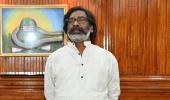'I don't believe there is an international conspiracy to swamp tribals in India or in Jharkhand.'

On September 25, just before elections to the assembly were announced, Jharkhand Chief Minister Hemant Soren announced a committee tasked with carrying out an economic and social survey of tribals of Jharkhand origin in Assam and elsewhere, like Andaman and Nicobar, to ensure they get their due rights.
'Tribals from Jharkhand were taken to other places such as Assam and Andaman and Nicobar by the British. Their number is about 1.5 to 2 million and they are fighting for their rights. It is known that tribals are working in the Assam tea gardens but they have not been given scheduled tribe status so far and are debarred from the welfare schemes meant for them,' Soren said.
His remarks came soon after Assam CM Himanta Biswa Sarma, the Bharatiya Janata Party's Jharkhand assembly co-in-charge, launched a sharp attack on the Soren government's unfulfilled promises to the state's tribal communities.
Soren hit back by urging Sarma to address the concerns of Jharkhandi tribals in Assam before criticising his government.
The plight of non-domiciled Jharkhand tribals is not a primary issue in the polls for two reasons.
One, welfare benefits, such as job and education reservations for tribals, are state-specific.
"Tribals from Jharkhand, for instance, cannot go to Kerala or some other state and demand job reservation in that state. The only exemptions are centrally administered regions and Union Territories. The CM's challenge to his Assam counterpart is not legally tenable," said Ranendra Kumar, former director of the Dr Ram Dayal Munda Tribal Research Institute, a state-funded entity that has studied the status of tribals from Jharkhand in other parts of India.
M Madhusudan, a Jharkhandi who runs the Web portal The Indian Tribal, said those living outside the state have a limited political voice in state polls.
"How will Jharkhand people in Assam return to vote here? Who will pay for their travel? After living outside the state for so long, are they even registered to vote here? This is just a political counter move by Soren," Madhusudan said.
Amid an election focused on tribal identity, Soren's move seeks to expose the BJP's weak appeal in tribal areas.
The BJP concedes it is weak in tribal areas, especially reserved tribal seats, but says it is a fiercer defender of tribal rights than parties like the Jharkhand Mukti Morcha or Congress, currently in power in the state in an alliance.
"In the 2019 Lok Sabha elections, the BJP lost five ST-reserved seats. And when Raghubar Das was chief minister, we lost 26 of 28 such seats. So, it was a continuing trend," said Arun Oraon, a former IPS officer now contesting for the Sisai assembly seat on a BJP ticket.
Oraon, who joined the BJP in 2019, said those Adivasis in Jharkhand who have not converted to Christianity are called 'Sarna', who constitute nearly 85 per cent of the tribal population.
"The rights and protection of the Sarnas have to be the top issue for the BJP this election," said Oraon.
The Sarna code -- the statutory codification of tribal laws -- has yet to be implemented, despite years of discussion, including by the JMM.
"It featured in the Lok Sabha elections also and has been discussed for the past 25 years."

Oraon said he met Biswa Sarma and gave him a note on the other issues that are central to Adivasi identity in Jharkhand.
"The issue of jobs is crucial. For long, the 1932 Khatiyan bill has defined local identity and domicile in Jharkhand. Those who can establish their ancestry to land records dating back to 1932 alone are entitled to claim government jobs and other benefits," said Oraon.
"But the Das government changed this date to 1985. So, in his tenure, all those who moved to Jharkhand in 1985 were entitled to reservation. Tribals were very angry about this," added Oraon.
Jharkhand, he said, continues to be excluded from the Panchayats (Extension to Scheduled Areas) Act of 1996 (PESA), which gives gram sabhas the power to govern on matters like education, health, and land use, among others.
Most states with significant tribal populations have implemented the Act.
Alongside, the dilution of powers of Gram Sabhas through the 2023 amendments in the Forest Conservation Act, which no longer requires their approval for development work in non-notified forest areas, is a cause for resentment in tribal communities, Oraon said.
Oraon said the JMM-Congress government has failed to address these concerns.
"They (JMM-Congress) keep lobbing the ball back to the central government," he said.
Ranendra Kumar refutes the other big issue relating to identity -- the stream of alleged infiltrators from Bangladesh.
"I don't believe there is an international conspiracy to swamp tribals in India or in Jharkhand," he said.
But Oraon insisted the issue is real, citing cases of tribal girls marrying non-tribals, leading to the transfer of forest land ownership outside the community.
While tribal identity dominates the election discourse, both alliances -- led by the JMM and the BJP -- are claiming to be the sole protectors of the community, which, on the other hand, is still weighing options.
Feature Presentation: Aslam Hunani/Rediff.com












 © 2025
© 2025